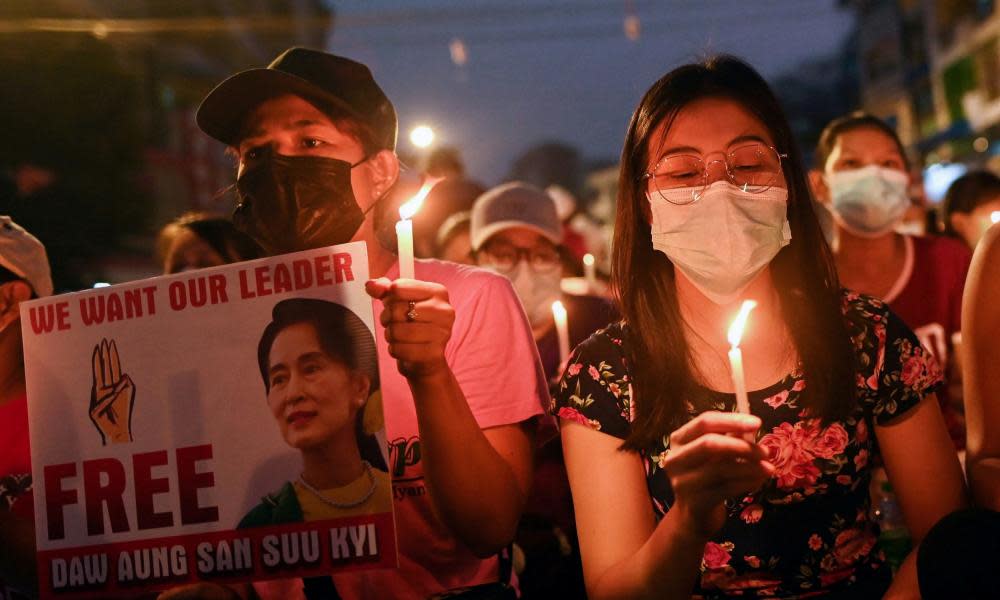MPs call for Myanmar citizens to get permanent residency in Australia amid crisis

The Morrison government faces increased pressure from within its own ranks to expand sanctions against Myanmar’s military leaders and to offer permanent residency to citizens who wish to remain in Australia.
Myanmar security forces have killed hundreds of civilians amid protests in the wake of the 1 February coup but the Australian government has held off ratcheting up sanctions against the top generals, arguing the junta is largely resistant to international pressure.
Liberal, Nationals, Labor and Greens parliamentarians have challenged that position in a new report published on Thursday.
Related: Australia should target Myanmar ‘gang leader’ for sanctions, UN expert says
The consensus report says the government should further consider imposing targeted sanctions on senior figures in the military and military-linked entities “who have played a role in the overthrow of democracy and subsequent violent repression of protests”.
This should include entities such as the Myanmar Economic Corporation and Myanmar Economic Holdings Public Company Limited, according to a subcommittee of parliament’s joint standing committee on foreign affairs, defence and trade.
The Australian government has not announced any additional sanctions since the military coup, despite international pressure. Australia has existing sanctions against five military figures who have been on the list since 2018 – but they don’t include the junta commander-in-chief, Min Aung Hlaing, and his deputy.
Guardian Australia revealed in April that a top UN expert was in direct talks with the Australian government about how to expand sanctions against the military regime, and had warned that crimes against humanity were being “committed before our very eyes”.
Nearly 400 civil society organisations inside Myanmar have accused Australia of “shameful inaction”. But Australian officials have argued that additional sanctions “would not have a positive impact on the ground” and “could potentially limit our ability to have influence”.
The new recommendations come from the foreign affairs and aid subcommittee, which is chaired by the Liberal MP Dave Sharma. Its deputy chair is the Labor MP Julian Hill and it also includes Nationals and Greens members.
The report says there are “different views on the issue of the effectiveness of sanctions amongst committee members, as there are amongst the international community” – but the group “as a whole” does believe sanctions warrant further consideration.
The post-coup death toll now stands at 877, according to latest figures compiled by the Assistance Association for Political Prisoners.
“The military coup in Myanmar has resulted in widespread loss of life and human tragedy, and has entirely reversed the significant development gains Myanmar has made in the past decade under civilian, democratic rule,” Sharma, a former Australian ambassador, said.
The committee report also cites concern regarding “substantial anxiety within the Myanmar diaspora in Australia about the lack of clarity around visa conditions”.
With about 3,380 Myanmar nationals in Australia on temporary visas as of the end of March, the Australian government has indicated it will not return them to the country while it is still an unsafe environment.
But the committee report urges the government to explore “pathways to permanent residency for Myanmar nationals in Australia given the uncertain situation they face” if they return.
The eight recommendations also include a call for the Australian government to “formally engage with groups and individuals representing the legitimately elected representatives” of Myanmar, including the Committee Representing Pyidaungsu Hluttaw (CRPH) and the National Unity Government.
Related: Children of the junta: the relatives of Myanmar’s military regime living in Australia
The committee says it was “concerned to learn” that the Australian government did not initially respond to communication sent to it by the CRPH.
Between February and March, the government “sought to tread carefully” because it had hoped to resolve complex consular cases such as that of the detained Australian economist, Prof Sean Turnell, the report says. Turnell served as an adviser to Myanmar’s democratic leader, Aung San Suu Kyi.

The report acknowledges Australia has legitimate national interests that would require contact with the military, known as the Tatmadaw, but says such communication should be “highly selective”.
Canberra also needed to take steps to avoid conveying any sense of legitimacy to military rule in Myanmar, it says.
While the report is a cross-party consensus, Labor members of the committee wrote an additional chapter accusing the government of being “far too slow to act” in response to the coup and resulting crisis.
“The government’s slowness to act sends precisely the wrong message to the brave people of Myanmar, the region and to democracies around the world,” the chapter said.
The Greens wrote that if the government failed to urgently apply sanctions to the key generals involved in the coup, the foreign affairs minister, Marise Payne, should provide a statement to parliament clearly explaining the reasons.
Related: Myanmar coup protesters – in pictures
The Greens’ spokesperson for foreign affairs, Janet Rice, plans to introduce legislation to the Senate to set a deadline for the government to explain its inaction.
“The Australian government has sat on its hands for almost five months while the people of Myanmar have called for urgent action, and other countries around the world have heeded their calls,” Rice said.
The committee has backed the government’s decision to suspend defence cooperation with Myanmar – but urges it to actively push for a global arms embargo, and to support UN efforts to hold leaders of the Tatmadaw to account and investigate serious human rights violations.
Some members of Myanmar’s diaspora community in Australia have argued the children of coup figures presently in Australia should be deported, and have handed a document outlining their names to Australian government officials, as Guardian Australia reported last month.
The parliamentary committee report says the Department of Home Affairs was asked in mid-May whether there were any investigations into relatives of the Tatmadaw in Australia – but it has not yet responded.

 Yahoo Movies
Yahoo Movies 
